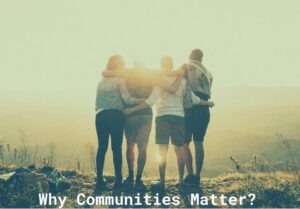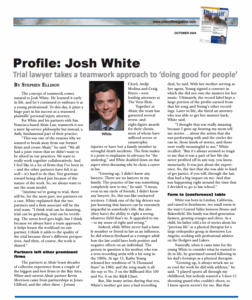From living paycheck to paycheck, she now enjoys a satisfying and successful career in employment law
By Stephen Ellison
 On her path into law, Tamarah Prevost worked a lot of different jobs alongside scores of co-workers; and in the end, that plethora of labor experience served a purpose. It now speaks volumes to her success as a plaintiffs’ employment law attorney.
On her path into law, Tamarah Prevost worked a lot of different jobs alongside scores of co-workers; and in the end, that plethora of labor experience served a purpose. It now speaks volumes to her success as a plaintiffs’ employment law attorney.
Working in the restaurant industry as a server and bartender for nearly a decade gave Prevost perspective on how some people struggled to make a living, to make rent each month, to provide for their families. She was able to witness first-hand how low-income workers barely scraped by. It was an eye-opener to someone who, by her own self-admission, came from a background of privilege.
“I worked with people from all walks of life,” she explained. “I worked with pregnant women and people that were injured on the job and women with lots of children but not very much education. And I really kind of saw how hard it can be when you’re living paycheck to paycheck and you have a family to support – how vulnerable that makes people that are working under those conditions.”
While working within that sector of the labor force may have planted a seed within Prevost, it was during another period in her career when she saw her fate. She had been working for a legal nonprofit in her native Canada, and while the nature of the work had her helping others, the work lacked fulfillment, she said, because she didn’t have enough authority.
“I actually worked in a courthouse for a legal nonprofit and just realized that I couldn’t help people without a law degree,” she said. “All I could do was give them information and not legal advice. And there were a lot of people with a lot of varied problems coming into the courthouse and asking for help. I just knew that I needed to get more education, and that law was really what I needed to do with my life.”
Today, Prevost is a well-known employment-law attorney in Northern California, running the employment law practice at San Francisco-based Altair Law. She fights for clients who have been harassed or discriminated against or retaliated against by their employer.
Prevost just joined Altair in December 2024 after more than eight years with Cotchett Pitre & McCarthy. It was not an easy decision to depart from such a reputable firm and start fresh, she said.
“I had an incredible time at CPM,” she said. “I learned a ton. I mean, they taught me everything I know about being a plaintiff lawyer and really built such a great foundation for me. I’m so grateful to them, and I honestly have nothing but amazing things to say about that firm, but Altair is a trial firm that has amazing lawyers that started it and built it. And I just realized that I wanted to do employment law 100% of the time. So that was why I left, and I’m now starting and building the employment practice at Altair, which is a really wonderful adventure and a great opportunity.”
Canadian roots
Prevost was raised in Vancouver, Canada, where her mother was a counselor at a juvenile detention center, and her father was a public speaker who went across Canada and coached small businesses about how to compete against giants like Walmart. Somehow that combination made it natural for her to want to fight for the underdog, she said. Her mom always had a very strong social justice mind, and Prevost remembers that having an impression upon her as a young child.
For her undergraduate studies, Prevost attended Simon Fraser University in Burnaby, British Columbia, where she earned a bachelor’s degree in communications, with a minor in sociology. Finding a law school came next.
“I applied to seven or eight Canadian law schools and one American, on a total whim,” she recalled. “I typed into Google ‘public interest, social justice law schools in the Bay Area,’ and Santa Clara University was the first one to come up. I clicked on the link, and their application was due in an hour – and I was in an airport. I typed a personal statement from the airport and submitted it, and I said to myself ‘there’s no way that I’m going to get into this school, but if I do, it’s meant to be because that was the least amount of work I put into any (application).’ Then that was the only one I got into, and I moved to California.”
A month or so later, Prevost said, she was accepted by three other law schools in Canada, but she’d already made the move and her decision.
Prevost said her aim in law school was to enter an area related to social justice, and she had some interest in working at Bay Area Legal Aid or a similar organization. But before she made any headway with those firms, she came into contact with someone working at Cotchett Pitre & McCarthy. She had already clerked for a firm in San Jose and worked as a research assistant for the SCU law school dean. She landed a law clerk job with CPM, and when she passed the bar exam, the firm hired her as an associate attorney. In about three years, she became a partner.
Striving to ‘fight back’
At CPM, Prevost was running the employment law department representing whistleblowers and victims of racial and sex discrimination as well as sexual harassment. She finds that employment law cases can be much more complex and difficult to try because of limits to access and because the client’s livelihood likely is at stake.
“Most people go into the workplace expecting that it will be the great equalizer and that they’ll be judged based on their performance or their job skill. And when they’re not … when (they) have been discriminated against, it’s probably the most discouraging and dehumanizing experience you can imagine,” Prevost explained. “It just reiterates a message that they’ve heard in other areas of their life, which is that they’re not enough. So, that has always been very important for me to fight back against.
“I kind of see myself as a civil rights lawyer, to some degree, because it’s about civil rights in the workplace,” she continued. “People rely on their jobs for so many different things, right? It’s their sense of identity, but it’s also their livelihood. It’s the way they support their children and their families, and it feels very purpose-driven for me … to uphold that sense of humanity and dignity that we should all be able to have.”
One of the biggest challenges, Prevost said, is that if a wrongful termination client comes to her, they’ve usually been locked out of the company’s system, so they don’t have access to evidence that could help prove their case, like emails or text messages. With nothing in the beginning, she has to “fight tooth and nail” through discovery for every document and other piece of evidence that might help her case.
Along the same lines, her best witnesses typically are former employees, and if she wishes to speak to current employees, she’s required to get the defense attorneys’ permission. That also makes it more difficult from an evidentiary standpoint because it means there are fewer witnesses she can talk to without engaging in the discovery process and depositions.
“It’s very much an uphill battle because it’s not an even playing field from an evidence discovery standpoint, right off the bat,” she said. “It means that the discovery fights we get into are all that much more important because that really is how I have to prove my cases, through all the evidence I need to compile. And employment cases, to a large degree, are often ‘He said-She said.’ There’s a factual dispute between what my client says happened and what the defense says happened. So, those emails are important, and any documentary evidence we can get is critical to proving our cases. Those are some of the unique challenges in the employment law world.”
Work and play
One memorable case Prevost discussed – in general terms because of confidentiality agreements – involved a fired vice president of sales at a tech company who, when hired, signed a stock options agreement as part of his compensation package, a common practice in the tech startup sector. But when he began working, he witnessed certain business practices he believed violated the law. He stood up for another employee who alleged that he was sexually assaulted. Through all of it, he was ultimately terminated because he continued speaking out about those issues.
On top of all those unlawful activities, the company refused to give Prevost’s client any information about his stock.
“When he would ask for it, he would say, ‘I just want to see how much of my stock has vested’ or ‘Can I have some of the underlying documents?’ When those weren’t being provided, he kept elevating those requests up the chain of command,” Prevost said. “He came to realize that there was no actual stock plan put in place. He had worked there a couple of years, and by the end of it, they didn’t really have anything to give him because the stock plan didn’t exist.”
The case was resolved in favor of Prevost’s client for an undisclosed figure, she said, “after discovery showed what was necessary for us to resolve the case.”
When she’s not at the office or in court, Prevost enjoys staying fit with boxing classes, spin classes and yoga. But what she loves to do most is spend time with her 65-pound dog named Paka that she adopted while she was attending the Consumer Attorneys of California conference on Maui in November. The Maui Humane Society has a program where people can take a shelter dog out for a day and on a hike, she explained. And that excursion became much more.
“So, I went there and was just planning on, you know, taking some shelter dog out and taking it on a hike and buying it some bacon and just giving it its best day,” she said. “I rented a car, and I pulled up, and they matched me with this dog. I put him in the back seat, and at the very first red light, he put his head on my shoulder. I was like, ‘All right, I guess I’m taking you home.’ We go to the beach and on hikes, and he’s a big, joyful part of my life.”
Do work that you enjoy
The one piece of advice Prevost offers to the next generation of lawyers is to find an area they’ll enjoy working in and find people who can help them find a way to that place.
“This can be a very challenging job,” she said. “Seek out the thing that gives you joy and makes you feel like you have a purpose because that’s what really sustains you through some of the more difficult times. The way I did that was by finding people that I looked up to and who could guide me towards that and really help me build my skills. If you can find people like that, stay with them and stay engaged. Otherwise, just try to do your very best to find what you love in the law and do that.”
Stephen Ellison is a freelance writer based in San Jose. Contact him at sjellison65@gmail.com.
Copyright © 2025 by the author.
For reprint permission, contact the publisher: www.plaintiffmagazine.com


